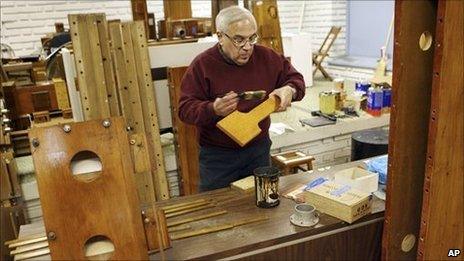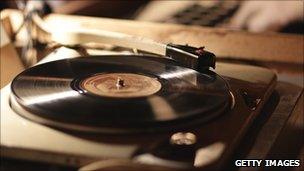Who, What, Why: What is a 'shellacking'?
- Published

Shellacking: This man is giving it rather than taking it
US President Barack Obama has spoken of the "shellacking" his Democrats received at the hands of voters. So where does the word come from?
It might be familiar to US sports fans, most recently used by the American press to describe the 4-1 beating the San Francisco Giants handed to the Texas Rangers in baseball's World Series.
But when Barack Obama described his experience in the mid-term elections as a "shellacking", it sent commentators on this side of the Atlantic scurrying for the dictionary.
In modern parlance, it is used to describe a good beating.
"Tipperary went about shellacking Antrim in such a ruthless way that it caused one to question the entire competition's structure," was how the Irish Times described a recent national under 21 hurling semi-final - demonstrating its occasional use among European English speakers.
However, a search through the newspaper archives reveals it is most widely used in North America and Australia, usually in a political or sporting context.
"Shellac was originally a noun referring to the yellow resin secreted by the lac insect," says Robert Groves, an editor of the Collins Dictionary of the English Language. The secretion itself is called lac - shellac is the commercial preparation of it.
Used in varnishes and polishes, it is in part a translation of the French phrase laque en écailles - lac in thin plates.
Hertfordshire-based French polisher Mark Brown says it was first harvested from trees by the French for use in coating furniture - giving the name to the technique he now practises.

Shellac was used to make gramophone records
"Before that, furniture was just waxed," he says. "It spread here about the 1720s and became more and more popular, especially with the Victorians when mahogany became fashionable."
Nowadays, traditional shellac's use has "pretty much died out," says Mr Brown, although his firm still prefers it.
"It's not very hard-wearing compared to the modern stuff, which is all chemical-based. You would use it for high quality antiques," he adds.
In the 20th Century shellac became associated with gramophone records, from which they were made before vinyl. But Mr Groves has an explanation for its relatively infrequent use in the UK.
"All the verb senses of this word are originally US or North American. Originally the verb meant 'to coat or treat something with shellac varnish'. This sense goes back to the 19th Century," he says.
"The sense in President Obama used the word, 'to defeat', goes back to the 1930s. Its original meaning was 'to beat or thrash' - to give someone a physical beating - and some early citations come from organised crime or gangster slang."
He says no-one knows how this change came about - but that shellacking can be compared to the slang use of words such as "plaster" and "paste", meaning to "defeat utterly and completely". Where a defeated British person may have suffered a "pasting" his American counterpart would have endured a "shellacking".
Whatever its origins, the UK's politicians and sportspeople alike will now be hoping never to be too closely associated with the word.